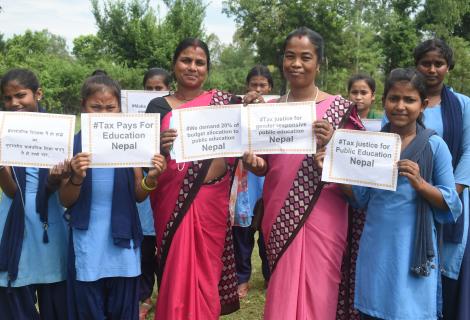Launch of factsheets with sustainable solutions to finance education

Due to the way the COVID-19 pandemic was managed, on top of years of austerity policies, education systems face a devastating crisis in public financing, and uncertainty over the quality of learning available when children return to education. More resources are needed, and solutions for education financing must respond to these challenges. Funded by GPE-EOL, the TaxEd Alliance connects Civil Society Organisations (CSOs) stakeholders working on tax issues with those working on education to create an effective transnational CSO response. Bringing together ActionAid, Education International, the Global Campaign for Education, Tax Justice Network, the Global Alliance for Tax Justice and its regional networks Tax And Fiscal Justice Asia and Tax Justice Network - Africa . The Alliance integrates the voices of marginalized communities with national level CSOs such as teacher unions and tax justice alliances, and coordinates their responses across national, sub-regional, regional, and global agendas and arenas.
“These country fact sheets bring vital capacity building tools to our collective campaigns. They unpack technical tax revenue and tax abuse issues with illustrative examples of the impact on the right to education.”
Liz Nelson, Director, Tax Justice & Human Rights, Tax Justice Network
The TaxEd Alliance has launched three factsheets assessing the progress towards the Sustainable Goal 4(SDG4) on education in Nepal, Senegal, and Zambia, the SDG4 financial requirements and sustainable solutions in how to achieve raise domestic resources in a progressive way to adequately fund not only education, but other public services as well. Progressive tax reform should be at the centre of plans to finance the SDGs.
"These factsheets not only refer to the state's financial obligations on education, they also reflect the interrelationships of financing with learning processes and the construction of inclusive quality systems".
Vernor Muñoz, Head of Policy, Advocacy & Campaigns, Global Campaign for Education
Tax incentives have been used to attract foreign direct investment, although they are often unnecessary and the IMF considers most forms of tax incentive to be harmful to the economy. The graphs below provide estimates in terms of the revenue losses to these harmful tax incentives and what 20% of that amount could provide in terms of education inputs. The TaxEd Alliance partners in these countries are engaging with their respective governments to address these issues, proposing progressive tax reforms to fill the education financing gap.
"These fact sheets show conclusively that the education SDG is achievable in each country if national governments take simple, strategic steps to increase the size of budgets overall, through progressive tax reforms. Rather than competing with other public services, a focus on tax offers a win-win scenario, where public education systems can be transformed alongside transformations in health systems, social protection and other essential public services."
David Archer, Head of Public Services and Civic Participation, Actionaid